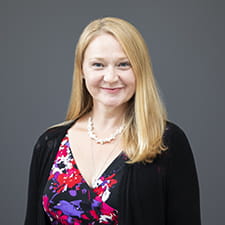The Future of Health: A Virtual Symposium
One of the best parts of my job is getting to learn about new and exciting programs across Drexel's 14 schools and colleges. There are always amazing things going on in these spaces. My colleagues are innovators and passionate educators, constantly striving to find the synergies between each other and their work. One of the things that makes me most proud to work at Drexel is watching these colleagues band together to put on top-notch programming that spans across the colleges, across our campuses, and across our disciplines, weaving the work they are doing in meaningful, cross-disciplinary ways.
There's no one better to chat about an event happening across our health care disciplines than my colleague Stephanie Schleidt, director of Graduate Admissions and Recruitment for the Graduate School of Biomedical Sciences and Professional Studies. She has been at the forefront of organizing The Future of Health: A Virtual Symposium and is here today to tell us all about it.
With this endeavor, we share our extensive experience and expertise in training and being health professionals and open new perspectives for students who intend to pursue a career path in this attractive field.
Thank you, Angela, for the opportunity to talk about our upcoming Drexel health professions' symposium. As you mentioned, I am responsible for admissions and recruitment at the Graduate School of Biomedical Sciences and Professional Studies in the Drexel College of Medicine. As such, I travel much to meet with students and advisors and attend graduate fair events.
The Situation
Over time, it became clear that many students, traditional and non-traditional, are interested in the health professions but often have little clear understanding what that means, what kind of careers are available, and what kind of preparation is needed. Students might not have the resources available to make informed decisions, often through no fault of their own.
These students...
- may not have a fruitful relationship with their academic advisor or do not know that they should strive for one.
- could be the first in their family to attend college, so nobody in their family can lend guidance.
- might have been out of school for a while and followed other paths and now have no connections to help them step into a different direction.
- may not know what to ask because they do not know what they don't know.
I reached out to my colleagues and our current students and found many have had similar experiences. From this understanding grew the idea for a health professions symposium that is not focused on recruitment per se, but rather on providing an educational platform for those interested in the very broad field of health-related professions.
The Solution
The Drexel health professions symposium is meant as a resource hub, consisting of a number of sessions with information about different professions, details about professions that students might not have realized exist, guidance for how to choose and what different career paths might be, point-by-point prerequisites for some of the more popular professions, and discussions about the importance of community engagement. There will also be a session of great importance and very close to my heart, a discourse about diversity in the health professions with people with a broad base of experience in this area. All of which are important and critical to consider, but not all are self-evident.
Don't get me wrong, I want everyone to come to Drexel for their undergraduate and graduate degrees because it is a great place to be, but that is not what this symposium is about. It is about offering students a reliable, free, and easily accessible resource that they can consult when they embark on the next leg of their academic or professional path.
Think about this
The Bureau of Labor Statistics projects that six out of the top 10 fastest growing occupations in the next eight years are health professions related. For the academic year 2020–2021, the Association of American Medical Colleges (AAMC) recorded 906,588 applications from 53,030 applicants to medical schools. Only 22,239 (42%) of those ultimately matriculated. That is only for medical schools. Clearly, many are interested in the field. There is a lot of potential, and medical school is not the only choice or even the right choice for everyone. A myriad of options and paths exist.
Goal of the Symposium
With this endeavor, we share our extensive experience and expertise in training and being health professionals and open new perspectives for students who intend to pursue a career path in this attractive field. And, we provide the tips and guidance these students might need along the way.
3141 Chestnut Street
Philadelphia, PA 19104
